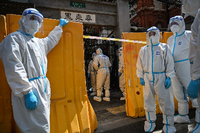In Germany there was clapping at the beginning of the corona pandemic, in China people have recently danced for health care workers. In this way, children and young people say thank you to the people in white full-body protective suits who, for example, knock on their door and want to test them on behalf of the state. Or are their parents more interested in recording the dances with their cell phones and then sending the videos around on social media? “Are you not embarrassed,” the China website whatsonweibo.com quotes a user of the short message service Weibo. “Don’t you think it would be better to leave these people alone than to let them see this performance?” Especially since the people in the white body suits in China are getting very busy right now.
The country is currently fighting the omicron wave – and Shanghai is once again fighting particularly hard. The 96 Covid cases reported in the metropolis on Monday and 4381 asymptomatic cases within 24 hours are little compared to the number of infections that are reported daily in German cities (Berlin 7329). But because China is pursuing a restrictive corona policy, the approximately 25 million residents of Shanghai still had to go into a shared lockdown.
From Friday, the residents of Puxi will go into lockdown
Since Tuesday, the residents of Pudong have had to stay in their homes for five days, from Friday the residents of Puxi will follow for five days. The Huangpu River meandering through the city forms the dividing line between the two halves of the lockdown – which is why China is now also talking about a yin-yang lockdown.
When this was announced over the weekend, people in Shanghai stormed the supermarkets to stock up on groceries. There were mass gatherings, hamster purchases and fights. “People still feel the panic,” said a 30-year-old woman of the ARD Tagesschau. “So they’re panicking grocery shopping all over town.”
Local lockdowns had already been in place across the city for the past few weeks whenever a new omicron case surfaced. “After ten days of lockdown in our apartment complex, each person has been tested seven times – but now we’ve suddenly been forbidden to leave our apartments,” writes Shanghai-based Scot Cameron Wilson on Twitter, “I can only assume things are getting completely out of control in Shanghai.”
With the new lockdown measures, criticism of the strict corona course in the country is also growing. Videos of verbal and physical altercations between residents and security forces who want to enforce lockdown measures are piling up on social media.
There are curious incidents, such as the one with a woman from Zhengzhou who had to stay in a hotpot restaurant for several days because of another guest’s corona case, who initially found the situation quite pleasant, but in the end said: “I can’t take a single bite anymore eat.” And tragic incidents like the nurse from Shanghai who died after an asthma attack because the emergency room of her own hospital was closed: all her colleagues were busy with corona tests outside the home. The BBC reports an elderly woman on her knees begging officials to get her husband out of the home despite lockdowns to treat his cancer.
China actually wanted to relax its rigid Covid control somewhat in order to reduce the economic consequences of local lockdown measures. On the other hand, if the world’s most populous nation allowed the omicron virus to circulate largely unhindered, the economic fallout for China and the world is likely to be far greater.
Sinovac does not protect as well as other vaccines
In contrast to Australia and New Zealand, which also fought rigidly against the corona virus but are now slowly reopening their borders, the People’s Republic does not have a high vaccination or booster rate. Also, the domestic vaccine Sinovac does not protect as well as other vaccines. The conditions in China can basically be compared well with those in Hong Kong, where around 6,000 mostly older, mostly unvaccinated people died after an omicron infection within two months. The British consultancy Airfinity predicts that a similar outbreak in China would take the lives of around a million people.
President Xi Jinping recently praised the fact that China, with its strict measures to date, has been able to save the lives of many people as an “extraordinary advantage of the socialist system”. “Protecting means winning,” says Xi Jinping, who wants to be elected head of the sole ruling Communist Party for the third time in October. At least until then, many observers suspect, China will continue its rigid anti-corona course.
